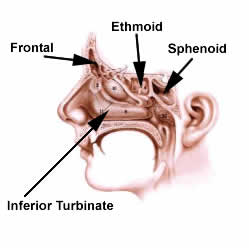Nasal and Sinus Anatomy and Function
The nasal passage allows air to flow into one’s throat and lungs while being warmed, cleaned and humidified. This passage is divided into two sides by thenasal septum which when off centered (a “deviated septum”), may block air flow and cause sinus problems. The turbinates are the structures on the outer walls of the nasal passage that swell and shrink to regulate airflow through the nose. Normally one side is more swollen and the other side shrunken to allow the swollen side to re-humidify itself while air flows through the shrunken side. About every two hours the swelling switches to the other side. This “nasal cycle” is usually not noticeable unless one breathes deeply through the nose. The turbinates become more swollen when one lies down because the heart doesn’t have to pump blood uphill to them like it does when we are standing. When lying on one’s side, the turbinate on the down side becomes more swollen. Colds and allergies also cause the turbinates to be swollen or congested.
Prior to Surgery
It is very important that the patient avoid taking aspirin, Motrin, ibuprofen, Advil, Aleve or naproxen for two weeks before and one month after surgery as these thin the blood and increase the chance for bleeding during and after surgery. You may take Tylenol (acetaminophen)
The Day of Surgery
On the day of surgery the patient should have nothing to eat or drink after midnight. CLEAR LIQUIDS THAT YOU CAN SEE THROUGH may be taken up to 6 hours prior to surgery, AFTER THAT NOTHING SHOULD BE TAKEN BY MOUTH, NOT EVEN WATER. Please check with your doctor to see if regular medication should be taken the morning of surgery. These should be taken with a minimal sip of water. Failure to follow these directions may cause the anesthesiologist to cancel the surgery.
You will need to arrive at the surgical facility well before the scheduled time of surgery. A day or two before surgery you will be called by someone from the surgical facility to tell you what time to arrive. After you arrive the nursing staff will take some information from you and someone from the anesthesia department will talk with you. An IV will be started and you will go to sleep once in the OR by medicine given through the vein. A breathing tube will then be placed through the mouth. During surgery the patient will be kept completely asleep by breathing gas through this tube under the supervision of an anesthesiologist. Heart rhythm, blood pressure and oxygen levels will be closely monitored throughout the operation. After surgery the patient will be in the recovery room for about 30 minutes. After this the family will stay with the patient in another recovery area for about 2 hours after surgery before leaving for home. For some patients with certain medical conditions plans will be made ahead of time to stay overnight after surgery.
After Surgery
Try to keep your head elevated as much as possible to decrease swelling and bleeding. Replace the pad under your nose as needed. It is common to have a fair amount of bloody discharge. If you are concerned that this is excessive please call the office. Avoid strenuous activity for a week or so after surgery. In most cases you will have nasal packing, our staff will let you know when that should be removed (usually in 1 to 4 days) Please make an appointment ahead of time for this. It may be possible to return to school or work the day after the packs are removed, but you should not engage in strenuous activity or blow your nose for 1 week after surgery.
Medications:
- Norco (Tylenol plus hydrocodone) 1 or 2 tablets every 4 hours as needed for pain. May be crushed or broken in half to take. May cause nausea or drowsiness.
- Ultram (tramadol) 1 or 2 tabs every 4 hours as needed for pain, may cause drowsiness
- Tylenol only for less severe pain for 1 month (no aspirin, Advil, Motrin, ibuprofen, naproxen, Aleve) Maximum dose of Tylenol for adults is 4000mg in 24 hours, for your child it is ________mg every 4 hours. Exceeding these doses may cause liver damage/failure. If you have questions on the dosing of Tylenol call the office or ask your pharmacist
- Keflex __________________ tab twice a day for 10 days
- Afrin (oxymetazoline) nasal spray (available over the counter) constricts blood vessels so it is helpful in stopping a nosebleed. If the nose is actively bleeding it go into soak a football shaped quarter sized piece of cotton with the Afrin spray. Next blow the nose thoroughly to get as much of the clotted blood out as possible, then squirt a fewAfrin into the side of the nose that is bleeding and place the Afrin soaked cotton back into the nose as far as possible. Pinch the soft part of the nose for 5 minutes by the clock. If this controls the bleeding leave the cotton in for several hours as removing it too soon may lead to another nosebleed. There may still be some mild bloody drainage from the nose, don’t let this worry you. If significant bleeding continues then call the office or go to the emergency room.
- Saline or salt water nasal spray (available over the counter) helps clean the nose after surgery. The day after the packs are removed use one spray each nostril 3 or 4 times a day for 1 to 2 weeks.
- Other medications as usual.
Regretfully we cannot call in prescriptions for narcotics after hours or on weekends. You’ll need to anticipate the need for refills or medication changes and call during business hours.
